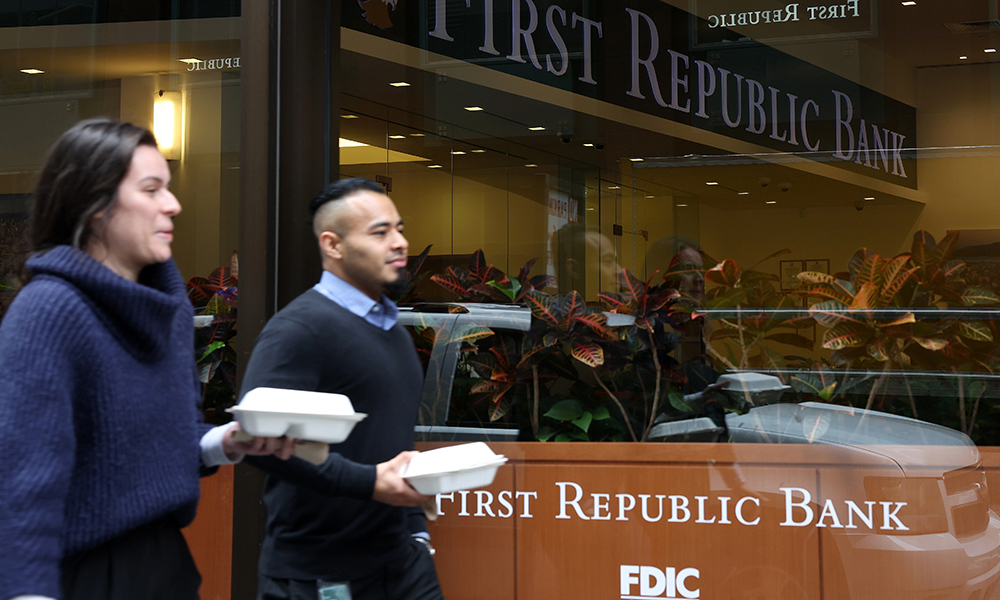
美国人认为在银行的存款是安全的,但对于这些金融机构的安全程度,人们的意见却出现了更大分歧。哈里斯民意调查(Harris Poll)对2,054名美国人的最新调查显示,至少90%的受访者表示,感觉在银行或信用合作社的存款是安全的,不论银行或信用合作社的规模多大。此次调查对受访者按年龄、性别、种族、民族、教育程度、地区、家庭收入和在网络上的倾向性进行加权计算,使其符合美国人口的实际比例。
假设美国人坚持自己的信念,或者更准确地说不取走存款(银行业危机会使这种行为演变成挤兑),这个调查结果对于银行而言就是好消息。令人意外的是,小型金融机构的客户认为存款安全的比例(93%),略高于大中型银行的客户。公众对存款安全的认知和存款机构的现状之间明显脱节,出现这种现象的原因可能是美国联邦政府宣布为硅谷银行(Silicon Valley Bank)和签名银行(Signature Bank)的储户兜底,以及大银行拯救第一共和银行(First Republic)。
美国联邦法律仅对联邦存款保险公司承保的存款机构提供不超过25万美元的存款保障,而在硅谷银行和签名银行,有超过90%的存款没有保险,因为这些银行的储户存款超过了25万美元的门槛,但对这两家银行的政府救助措施却将所有储户包含在内,不考虑储户的存款规模。这样做产生了一个问题:美联储现在是否会救助任何规模的账户。
虽然美联储主席杰罗姆·鲍威尔最近对记者表示,对硅谷银行和签名银行的救助“证明所有储户在银行系统中的存款都是安全的”,但美国财政部长珍妮特·耶伦却表示,全覆盖存款保险“不是我们要采取的做法……我们没有考虑这种政策”。
根据调查结果判断,美国人期待类似于鲍威尔宣言的政策能够出台。然而在耶伦改口之后,标普500指数净下跌1.7%,由此可以看出,耶伦的言论令市场感到紧张。
以下是另外三个值得关注的趋势。
美国年轻人依旧没有忘记2008年所造成的影响
美国年轻人,尤其是见证了父母在2008年金融危机期间苦苦挣扎的年轻人,比年长的美国人更担心存款安全。18至26岁的Z世代受访者相信存款安全的比例最低。他们尤其担心大型存款机构:81%的小银行客户表示存款是安全的,中等银行客户的比例为84%,而大银行客户持同样观点的比例只有78%。
越富有的人越担心
不出意外,越富有的美国人越担心银行倒闭。在家庭收入超过10万美元的受访者中,大多数(55%)担心小银行倒闭(整体比例为46%),50%担心中等银行倒闭(整体比例为44%),48%担心大银行倒闭(整体比例为42%)。这是唯一一个至少大多数受访者担心银行倒闭的收入群体。
工作地点影响预期
这个十年有一条线贯穿始终,那就是无尽的焦虑循环:海外战争,美国国内的社会和政治动荡等。新冠疫情最近进入了第四个年头,每周依旧有数千人死于新冠。通胀居高不下,经济衰退迫在眉睫。
有好消息吗?这种持续危机的现状促使美国人重新调整优先事项,更重视共同的体验。
现场办公者对银行倒闭的担忧,低于远程办公和混合办公的同事。每天到办公室现场办公的上班族,是唯一一个按净人数计算对各种规模的银行倒闭都不担心的群体。大多数远程办公和混合办公的上班族担心银行倒闭。或许源于非传统工作安排的普遍不安全感,令他们变得更紧张不安。
银行可能会成立、倒闭或合并,但最重要的是与家人和朋友共度时光。在后疫情时期,陪伴家人朋友具有独特的重要性。或许与以往相比,现在更多民主党人、独立人士和共和党人都认同,与家人朋友在一起的时光是有意义的和充实的。对于大多数美国人来说,时间比金钱更重要。
作为两个儿子的父亲,看到家长们花更多时间陪伴孩子,教育子女,共同创造美好的回忆,这令我备受鼓舞。越来越多人重视面对面的亲子时光,这对于我们的后代而言是好事。
虽然美国人要面对国内和国外的危机,但我们的社交圈子可以提供安全的避风港,等待外面的世界自行回到正轨。(财富中文网)
本文作者威尔·约翰逊为哈里斯民意调查的首席执行官。
Fortune.com上发表的评论文章中表达的观点,仅代表作者本人的观点,不代表《财富》杂志的观点和立场。
翻译:刘进龙
审校:汪皓
美国人认为在银行的存款是安全的,但对于这些金融机构的安全程度,人们的意见却出现了更大分歧。哈里斯民意调查(Harris Poll)对2,054名美国人的最新调查显示,至少90%的受访者表示,感觉在银行或信用合作社的存款是安全的,不论银行或信用合作社的规模多大。此次调查对受访者按年龄、性别、种族、民族、教育程度、地区、家庭收入和在网络上的倾向性进行加权计算,使其符合美国人口的实际比例。
假设美国人坚持自己的信念,或者更准确地说不取走存款(银行业危机会使这种行为演变成挤兑),这个调查结果对于银行而言就是好消息。令人意外的是,小型金融机构的客户认为存款安全的比例(93%),略高于大中型银行的客户。公众对存款安全的认知和存款机构的现状之间明显脱节,出现这种现象的原因可能是美国联邦政府宣布为硅谷银行(Silicon Valley Bank)和签名银行(Signature Bank)的储户兜底,以及大银行拯救第一共和银行(First Republic)。
美国联邦法律仅对联邦存款保险公司承保的存款机构提供不超过25万美元的存款保障,而在硅谷银行和签名银行,有超过90%的存款没有保险,因为这些银行的储户存款超过了25万美元的门槛,但对这两家银行的政府救助措施却将所有储户包含在内,不考虑储户的存款规模。这样做产生了一个问题:美联储现在是否会救助任何规模的账户。
虽然美联储主席杰罗姆·鲍威尔最近对记者表示,对硅谷银行和签名银行的救助“证明所有储户在银行系统中的存款都是安全的”,但美国财政部长珍妮特·耶伦却表示,全覆盖存款保险“不是我们要采取的做法……我们没有考虑这种政策”。
根据调查结果判断,美国人期待类似于鲍威尔宣言的政策能够出台。然而在耶伦改口之后,标普500指数净下跌1.7%,由此可以看出,耶伦的言论令市场感到紧张。
以下是另外三个值得关注的趋势。
美国年轻人依旧没有忘记2008年所造成的影响
美国年轻人,尤其是见证了父母在2008年金融危机期间苦苦挣扎的年轻人,比年长的美国人更担心存款安全。18至26岁的Z世代受访者相信存款安全的比例最低。他们尤其担心大型存款机构:81%的小银行客户表示存款是安全的,中等银行客户的比例为84%,而大银行客户持同样观点的比例只有78%。
越富有的人越担心
不出意外,越富有的美国人越担心银行倒闭。在家庭收入超过10万美元的受访者中,大多数(55%)担心小银行倒闭(整体比例为46%),50%担心中等银行倒闭(整体比例为44%),48%担心大银行倒闭(整体比例为42%)。这是唯一一个至少大多数受访者担心银行倒闭的收入群体。
工作地点影响预期
这个十年有一条线贯穿始终,那就是无尽的焦虑循环:海外战争,美国国内的社会和政治动荡等。新冠疫情最近进入了第四个年头,每周依旧有数千人死于新冠。通胀居高不下,经济衰退迫在眉睫。
有好消息吗?这种持续危机的现状促使美国人重新调整优先事项,更重视共同的体验。
现场办公者对银行倒闭的担忧,低于远程办公和混合办公的同事。每天到办公室现场办公的上班族,是唯一一个按净人数计算对各种规模的银行倒闭都不担心的群体。大多数远程办公和混合办公的上班族担心银行倒闭。或许源于非传统工作安排的普遍不安全感,令他们变得更紧张不安。
银行可能会成立、倒闭或合并,但最重要的是与家人和朋友共度时光。在后疫情时期,陪伴家人朋友具有独特的重要性。或许与以往相比,现在更多民主党人、独立人士和共和党人都认同,与家人朋友在一起的时光是有意义的和充实的。对于大多数美国人来说,时间比金钱更重要。
作为两个儿子的父亲,看到家长们花更多时间陪伴孩子,教育子女,共同创造美好的回忆,这令我备受鼓舞。越来越多人重视面对面的亲子时光,这对于我们的后代而言是好事。
虽然美国人要面对国内和国外的危机,但我们的社交圈子可以提供安全的避风港,等待外面的世界自行回到正轨。(财富中文网)
本文作者威尔·约翰逊为哈里斯民意调查的首席执行官。
Fortune.com上发表的评论文章中表达的观点,仅代表作者本人的观点,不代表《财富》杂志的观点和立场。
翻译:刘进龙
审校:汪皓
Americans think their money is safe in their banks–but they’re more split regarding exactly how secure those institutions are. At least nine in 10 respondents said that they feel their money is safe at their bank or credit union, regardless of its size, according to a new Harris Poll survey of 2,054 Americans, whose responses have been weighted for age, sex, race and ethnicity, education, region, household income, and propensity to be online to bring them into line with their actual proportions within the U.S. population.
This is good news for banks, assuming that Americans act on their beliefs or, more precisely, don’t act by pulling their money out, which would exacerbate the banking crisis. Surprisingly, the customers of small financial institutions were slightly more likely to believe that their money is safe (93%) than the customers of medium and large banks. The remarkable disconnect between how safe the public believes their money is and the state of the institutions in which it resides is likely due to the federal government’s proclaimed backstop for depositors at Silicon Valley Bank and Signature Bank, as well as the rescue of First Republic by large banks.
Federal law protects deposits of up to $250,000 in FDIC-insured institutions but the Silicon Valley and Signature bailout–where more than 90% of deposits were uninsured because they exceeded that threshold–took care of every depositor, regardless of account size. That has raised the question of whether the Fed will now bail out accounts of any size.
While Federal Reserve Chairman Jerome Powell recently told reporters that the Silicon Valley and Signature bailouts “demonstrate that all depositors’ savings in the banking system are safe,” Treasury Secretary Janet Yellen has ruled out universal deposit insurance as “not something we have looked at…not something we’re considering.”
Judging by our survey, Americans expect something like the Powell declaration will play out. However, judging by the S&P 500’s net 1.7% drop after Yellen backtracked, markets still have Yellen-powered jitters.
Here are three other noteworthy trends:
Younger Americans still have scars from 2008
Younger Americans, especially those who watched their parents wrestle with the financial crisis of 2008, are more worried than older Americans. Generation Z respondents aged 18 to 26 are least often confident in their money’s safety. And they are especially wary of larger institutions: 81% of small-bank customers said that their money is safe and 84% of medium-bank customers said the same–but just 78% of large bank customers felt the same.
Those with the most to lose worry the most
Unsurprisingly, wealthier Americans are the most worried about bank failures. A majority–55%–of those with household incomes of over $100,000 worry about small banks closing (versus 46% overall), 50% are concerned about medium-sized banks (compared with 44% overall) and 48% worry about large banks (compared with 42% nationally). It’s the only financial range with at least a plurality expressing concern about closings.
Where you work affects your outlook
The through line is the endless anxiety loop that has characterized this decade: War abroad, and social and political upheaval at home. The COVID era recently has entered its fourth year with thousands still dying weekly. Inflation remains high and a recession may well be in the offing.
The good news? This state of continuous crisis has prompted Americans to reprioritize, with an emphasis on experiences together.
In-person workers are less concerned about banks closing than their remote and hybrid colleagues. Those who go into the office every day are the only net-unconcerned demographic group, regardless of bank size. Clear majorities of remote and hybrid workers worry about bank failures. Perhaps generalized insecurity stemming from nontraditional work arrangements is making them more nervous.
Banks may come, go, or merge–but nothing beats spending time with family and friends. They have taken on unique importance in today’s post-pandemic world. Perhaps more than ever, Democrats, Independents, and Republicans agree that time spent with family and friends is meaningful and fulfilling. For most Americans, time is more important than money.
As a father of two sons myself, it’s encouraging to see parents spend more time with their children, teaching lessons and creating memories. Face-to-face fathering is on the rise, and that can only bode well for future generations.
Americans face crises at home and abroad, but our social circles can provide a safe haven while the outside world corrects itself.
Will Johnson is the CEO of The Harris Poll.
The opinions expressed in Fortune.com commentary pieces are solely the views of their authors and do not necessarily reflect the opinions and beliefs of Fortune.






